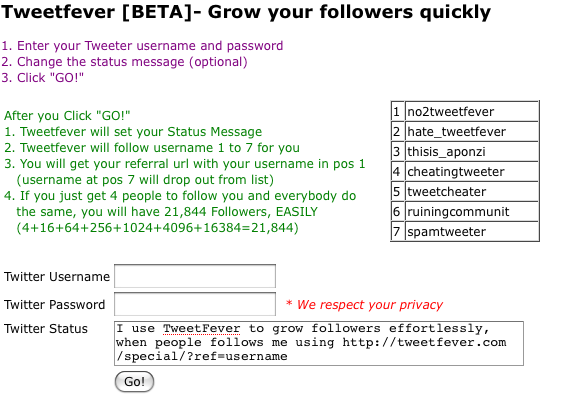Tonight i stumbled across a website that promises to get you more than 20,000 followers. How? The same way that letter you got in grade 2 promised to make you $500 dollars.

What’s wrong with this picture?
First of all, you’re no longer in grade 2, so you should be smart enough to realize that this is to Twitter what Bernie Madoff is to the financial community: a Ponzi scheme. And just like Madoff’s promised returns, your 21,844 followers are unlikely to materialize.
If you recognized that, you’re smarter than all the people who’ve signed up for this little ponzi. You’ll see me there, too, but I expect a get-out-of-jail-free pass on this one: I signed up b/c I was trying to think of ways to jam this kind of behavior. What we came up with — once I realized that both my name and Social Signal’s were going to appear on this nasty little ponzi site until all 7 downstream spots were used up — was to fill up the queue with various anti-ponzi usernames. Among other side effects, this has locked us out of our Twitter accounts for a couple of hours (because said ponzi site is now busily trying to log into my Twitter account so it can follow people on my behalf — and I’ve changed the password).
But there’s more at stake here than the personal disappointment of failing to get your 20,000 “easy” follows, or even getting locked out of your Twitter account.
Imagine if this scheme did work, and everyone got their 20,000 followers. Imagine a dozen more services like this — so that Twitter can be busting with people who have thousands and thousands of followers.
What do those followers do for you, exactly — other than beefing up the number in your sidebar so you can sell yourself as some kind of social media whiz? Do you think that the 20,000 random people who are following you actually care about what you’re saying? For that matter, do you want your feed filling up with tweets from people some random algorithm assigned you to follow?
Twitter friends and followers are more than statistics. They’re real relationships, real people. When we get so obsessed with the number that we’re willing to entrust the following process to a ponzi scheme, we’ve lost sight of the purpose of this — or any other — social network: to connect us, and to help us communicate.
So let me thank the ponzi-tweeters of this world for giving me a new perspective on my recent obsession with how quickly my followers are growing, or what my follower/followee ratio looks like. Those are just numbers. What I value in Twitter are the people, the conversations, and the meaningful connections we make together.

Recent Comments